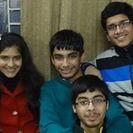We intiate the program from ground zero for strong foundation of each trainee belonging to different educational backgrounds. We make sure that by end of training you are proficient enough with programming to crack interview of dream technical companies.
Industrial Training Program
Overview
Apart from acquiring technological skills, adapting to an industrial environment is of utmost importance. Keeping this in mind, Coding Blocks bring back to you once again Six Months Comprehensive Industrial Training program. This will be a five-six month long program wherein you'll learn some important as well as can choose for technologies such as Web Development or most wanted skill like Data Science. This will help you gain the skill set required by the industry these days, while working in a startup environment. In the last two months of the program.
This is a once in a lifetime opportunity which we think you wouldn't want to miss. So, go ahead and register at the link below for an exciting educational journey through the world of technology. All the best!
Register Now
VIDEO TESTIMONIALS
What our previous year student's say
Course Contents
Stage 1 - Java with DS & Algo
Getting Started
- Pseudo code
- Getting started with Java, IDE Installation
Getting a Hold of Java
- Variables,Loops, Conditional Statements
- Methods, Reference Variables
- Arrays and ArrayLists
- Strings and 2-D Arrays
Introduction to Advanced Topics
- Recursion-I
- Space Time Complexity Basics
- Stacks and Queue Basics
- Problem Solving
Recursion & Backtracking
- Recursion
- Back-Tracking
- Space Time Complexity Analysis
Foundational DS
- Arrays & Bitmasking Vectors
- Stacks Queues Problems
- Linked Lists
Sorting Searching And Hashing
- Divide & Conquer
- Sorting Algorithms
- Binary Search Variants
- Bitmasking and Hashing
Advanced Data Structures
- Stacks Queues Linked Lists
- trees & Tries
- Graphs
- Heaps and Priority Queues
- Binary Search Trees
DP vs Greedy Techniques
- Greedy Techniques
- Dynamic Programming
STL | Interview Problems
- Complete Collection Framework
- Interview problems
Stage 2 - NodeJS Web Development
HTML/CSS
Lectures 1-2
- Table Layouts
- Flex Boxes
- Bootstrap Columns
- Media Queries and Mobile Responsive Design
- Grids
Javascript
Lecture: 3-10
- ECMAScript 6 Syntax and Standards
- Function Closures and IIFEs
- Classes, Constructors and Prototypes
- Lexical Scopes, Arrow Functions and Variable spreading
UNIX AND Git
Lecture 11-12
- Unix and SysAdmin/Devops
- Schema Designing
- Git
NODEJS
Lecture 12-16
- NodeJS Modules
- Filesystem API, Events and Streams
- ExpressJS Framework for creating REST APIs
- Handlebars for server side web rendering
- Socket.IO for realtime communication
Databases
Lectures 17-18
- Flat files on server
- MySQL
- Using ORMs like Sequelize
- MongoDB
Advanced Topics & Deployment
Lectures 19-25
- Security
- Scaling
- Using Frontend Templates
- 3rd Party Libraries and Frameworks
- Deploying a live web project
Stage 3 - Interview Prep Non Coding
Networks
- Servers Clients and DNS
- Web Protocols and Domain Names
- IP Addresses Introduction and Classes
- MAC Address
Web Technologies
- Web Server Architecture and Components
- Search Engine Trivial Solution
- Web Technologies and Frameworks
Operating Systems
- Introduction to OS and types
- Kernel Responsibilities
- Working of OS
Process Management
- Process Lifecycle and Queues
- Critical Section Selection
- Dining Philosopher Cigarette Smoker
Database Management Systems
- Database Design
- SQL Statements
- SQL Queries - Cars and Manufacturers
System Design
- Introduction to System Design
- System Design Steps
Course Schedule
| Center | Start Date | End Date | Day & Time | Batch Type | |
|---|---|---|---|---|---|
| Noida | 27th Jan 2021 | TBD | (11:00 AM - 2:00 PM) On (Mon, Wed, Fri) | Morning |
REGISTER NOW
Stage 1 - Python Development
Getting started with Python
- Why Python?
- Setting up Python on windows, mac, linux
- Basic Python syntax
- Variables, data structures, functions
- Conditionals and loops
Python Utilities
- Basic file handling
- Dealing with errors in Python
- Basic Python modules (time, datetime, random, os, sys, collections, etc)
Intermediate Python
- Iterators, generators and decorators
- Object oriented programming
- Working with files (CSV/ZIP/PDF/JSON/XML)
Python for web
- Introduction to web APIs
- Interacting with web APIs (GET and POST requests)
- File downloader using Python
- Web scraping using requests and BeautifulSoup
- Web crawling
- Web automation using selenium
Web development using Flask
- Introduction to Flask
- Setting up python environment
- Basic web application using Flask
- Authentication using Flask
- Deploying Flask app on Heroku
Database and SQL
- Database selection reasonong
- Jupyter DB Connection extention
- ORM with SQLalchemy
- Connecting with non relational databases
Creating CLI for your application
- Introduction to argparse
- Using placeholders and helpers
Stage 2 - Data Science using Python
Python Recap
Lectures 1-5
- Data Science Quickstart Mode
- Data Structures
- Functions
- OOPS and Modules
- File Handling in Python
Mathematical Concepts and Data Visualisation
Lecture: 6-10
- Linear Algebra
- Data Visualisation
- Probability Distribution & Statistics
- Numpy, Scipy, and Scientific computation with Python
- Data Analysis using Pandas
- Data Acquisition - Web Scrapping, Web APIs
- Data Scraping, Handling, Cleaning
- Importing/Exporting Data from/to various sources
- Identify missing/outliers data
- Normalizing and Formatting data
Machine Learning Algorithms
Lecture 11-15
- K-Nearest Neighbour search
- K-means clustering
- Linear Regression
- Logistic Regression
- Decision trees and Naive Bayes
- Random Forest Classifiers
- Manual Ensembling Vs. Automated Ensembling
- Bagging, Boosting of trees
- Ada Boost and XGBoost
- Support Vector Machines
- SVD and Principal Component Analysis
Segmentation and Time Series
Lecture 16-20
- Introduction to Segmentation
- Subjective Vs Objective, Heuristic Vs. Statistical
- Heuristic, Behavioral Segmentation Techniques
- Hierarchical Clustering vs Spectral Clustering
- Feature selection and importance
- Principle component Analysis (PCA)
- Time Series - Components
- Time Series - Averages, Smoothening, AR Models
- Understanding Forecasting Accuracy - MAPE, MAD, MSE, etc
Deep Learning
Lectures 21-24
- Neural Architectures and Training
- Deep learning methods
- Convolutions and the GoogLe Net
- Dimensions revisited: The Auto-encoder
- Recurrent and Combined Architectures
- Transfer Learning
Projects and case studies
Across Lectures
- Face Recognition
- Image classification and Object detection
- Text/Poem generating bot
- Recommender systems
- PokeMon Classification
- Web Crawler
- Cartpole Player
- Dominant Color Extraction
- Fashion Retailing Forecasting
Stage 3 - Interview Prep Non Coding
Networks
- Servers Clients and DNS
- Web Protocols and Domain Names
- IP Addresses Introduction and Classes
- MAC Address
Web Technologies
- Web Server Architecture and Components
- Search Engine Trivial Solution
- Web Technologies and Frameworks
Operating Systems
- Introduction to OS and types
- Kernel Responsibilities
- Working of OS
Process Management
- Process Lifecycle and Queues
- Critical Section Selection
- Dining Philosopher Cigarette Smoker
Database Management Systems
- Database Design
- SQL Statements
- SQL Queries - Cars and Manufacturers
System Design
- Introduction to System Design
- System Design Steps
Course Schedule
| Center | Start Date | End Date | Day & Time | Batch Type | |
|---|---|---|---|---|---|
| Noida | 27th Jan 2021 | TBD | (11:00 AM - 2:00 PM) On (Mon, Wed, Fri) | Morning |
REGISTER NOW
Mentors
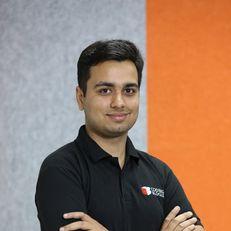
Prateek Narang
Founding Member
Prateek Narang
Founding MemberPassionate about teaching, Prateek is a CS graduate from DTU. He has previously worked with SanDisk, HackerEarth. He has also won various hackathons including Google’s Code For India, Smart City Hackathon, qualified ACM-ICPC regionals and published papers in International Journals. His interactive CV (www.prateeknarang.com) is also popular in 120+ countries.
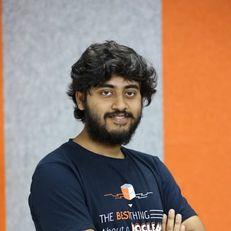
Arnav Gupta
Founding Member
Arnav Gupta
Founding MemberArnav Gupta, also popular as @ChampionSwimmer, is an acclaimed Android developer and two timer GSoC-er. He has presented at large conferences like JSFOO, DroidCon, FOSSASIA and OSDConf. He has also worked with Sony, Micromax, Cyanogen and the likes. Arnav has also active contributed int the development of Android OS, Linux Kernel and will also be mentoring students in GSoC’17.

Kartik Mathur
Mentor
Kartik Mathur
MentorKartik Mathur is an NSIT graduate and extremely popular amongst his students for his engaging ways of teaching. His students are topping the charts in cracking Interviews across Top Tech and Product companies around the world with whooping packages. He is a Competitive programmer, a full stack Web developer and also contributes to many Start-ups in India and abroad. Known for his humour and memes, he can be usually located in Coding Blocks during the day or Starbucks in the evening.
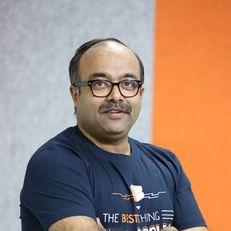
Rajesh Sachdev
Founding member
Rajesh Sachdev
Founding memberRajesh has 20+ years of experience in IT/Corporate sector. He has previously worked with corporates like Nagarro, Cadence, American Express. He left IT industry in 2013 and moved to education with a passion to help students accomplishing their career goals. He did MS from BITS Pilani.
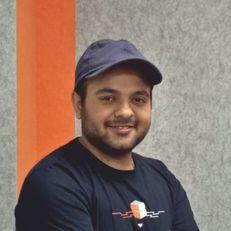
Rishab Kapoor
Mentor
Rishab Kapoor
MentorA graduate from Guru Nanak Dev University, Rishab has worked with Harman Connected Services as a software engineer. He is proficient with web development related technologies like HTML, CSS, Javascript along with Internet of Things development, OSGi framework, Spring and Hibernate.
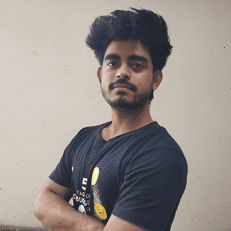
Shubham Rawat
Mentor
Shubham Rawat
MentorShubham Rawat is an Open Source geek and a fitness freak. He was a Google Code-In mentor with JBoss Community under RedHat. He has worked with Debezium Project under Redhat and also with Vlyop technology . He loves to solve puzzles and generally found dwelling with Spring Boot applications.
FAQ
(Drop a line at admissions@codingblocks.com if you have further queries)
I am not from CSE/IT background. Is this training suitable for me?
Will I get a job after this course?
We offer Placement assistance to all candidates in Coding Blocks. In the Industrial training program, we stress more on Job drives since it is the need of the hour. As soon as the first phase of the course is through, we start pushing students towards opportunities which Coding Blocks offers.
What is the duration of the training program?
The program duration is of about 5-6 months. This is a long term training program for students who have an entire semester dedicated to industrial training, or are willing to manage the training with their regular college.
Will I be awarded a training certificate after the program?
Yes, you will get completetion certificates for training program.


